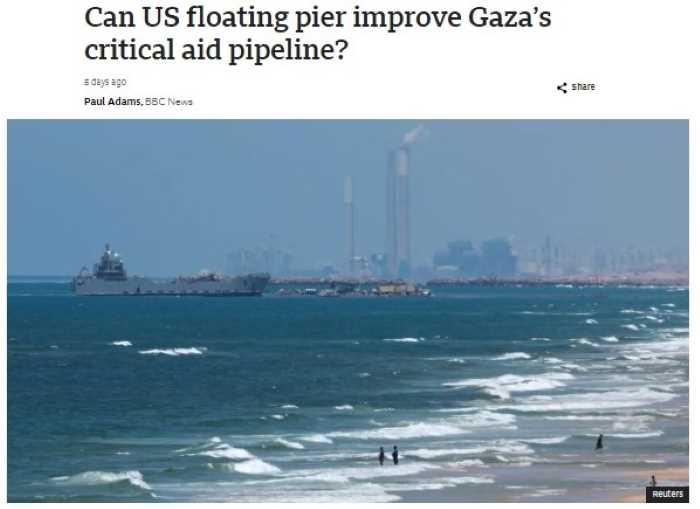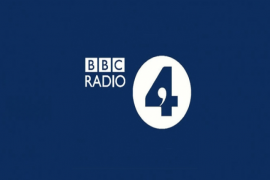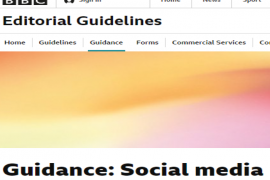Last week the BBC News website published two reports by Paul Adams concerning the floating pier recently installed by the US military in the Gaza Strip in order to increase aid supplies:
“US says floating pier for aid anchored to Gaza beach”, 15/5/24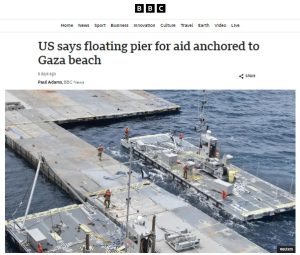
“Vice Adm Brad Cooper, deputy commander of US Central Command, said commercial ships would collect pallets from Cyprus and deliver them to a floating platform anchored several kilometres off the coast of Gaza.
Smaller US military vessels, capable of carrying between five and 15 lorries of aid, will then transport it to a floating causeway, several hundred metres long, fixed to the beach in Gaza.
Lorries will travel along the causeway before dropping off the aid at a marshalling yard on the beach.
Vice Adm Cooper said the UN, primarily the World Food Programme, will be responsible for the onward distribution of aid.”
“Can US floating pier improve Gaza’s critical aid pipeline?”, 16/5/24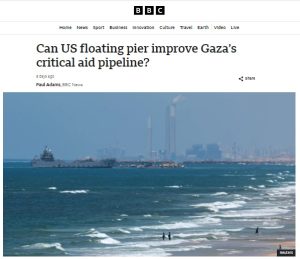
“Because of the shallowness of the waters off the Gaza Strip, pallets of aid will be transported to the floating platform before being ferried to the pier aboard logistics support vessels (LSVs), capable of carrying up to 15 lorries each.
Fleets of lorries will ferry the aid ashore to a large marshalling yard prepared and guarded by the Israeli military.
From there, aid agencies – primarily the World Food Programme – will be responsible for distributing supplies across the Gaza Strip.
Vice-Adm Brad Cooper, deputy commander of US Central Command, said he initially expected to see about 90 lorries a day delivering aid via the maritime route, known as a Joint Logistics Over-The-Shore (JLOTS) capability.
He said this figure would rise to 150 lorries a day.”
Both those reports include a graphic sourced from UNOCHA and dated May 16th.
Despite the Erez Crossing having been reopened on May 1st following extensive construction work (which has not been reported by the BBC) both to repair destruction caused during Hamas’ attack on October 7th 2023 and in order to convert it from a pedestrian facility to a vehicular crossing, that graphic inaccurately informs BBC audiences that the Erez Crossing is “closed”.
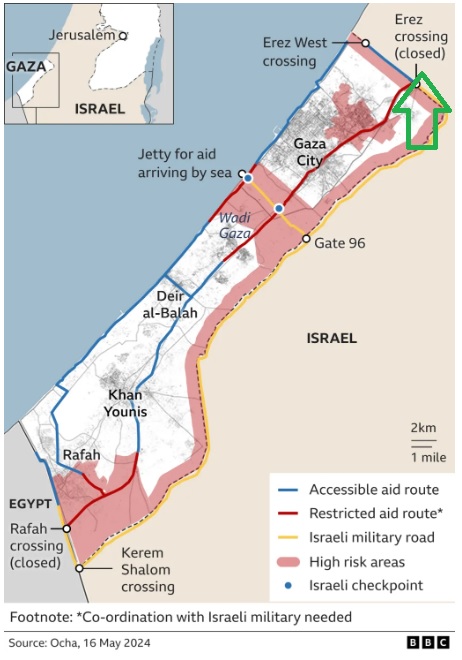
Ignoring Hamas’ attacks on the Kerem Shalom crossing which have resulted in the deaths of four Israeli soldiers, Adams’ second report also tells readers that: [emphasis added]
“With Israel’s military operation around Rafah now in its 11th day, almost no aid is getting in through the south.
Israel has recently opened crossing points into the north, but everyone agrees that the quantity of aid reaching 2.2 million desperate Gazans is still far from adequate.”
And:
“But with the Rafah crossing with Egypt closed and the nearby Kerem Shalom crossing with Israel barely functioning, there’s a critical break in the aid pipeline.”
On the day that Adams’ first report was published, 246 trucks carrying food entered the Gaza Strip.
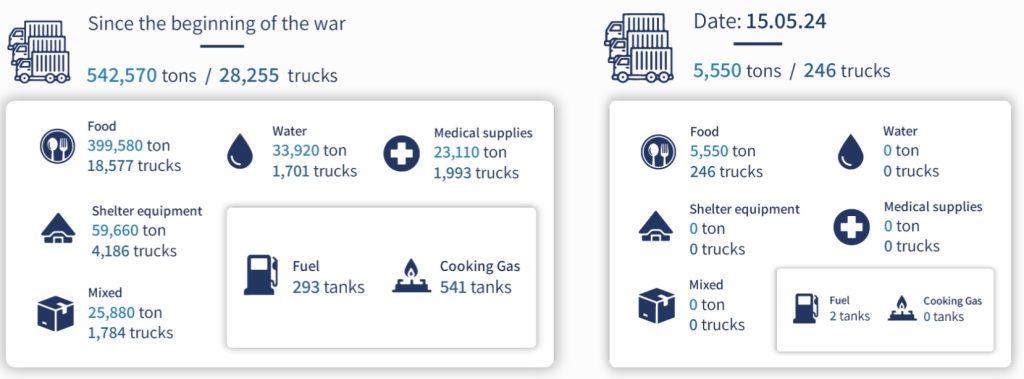
On the day that Adams’ second report was published, 365 trucks of aid entered the Gaza Strip.
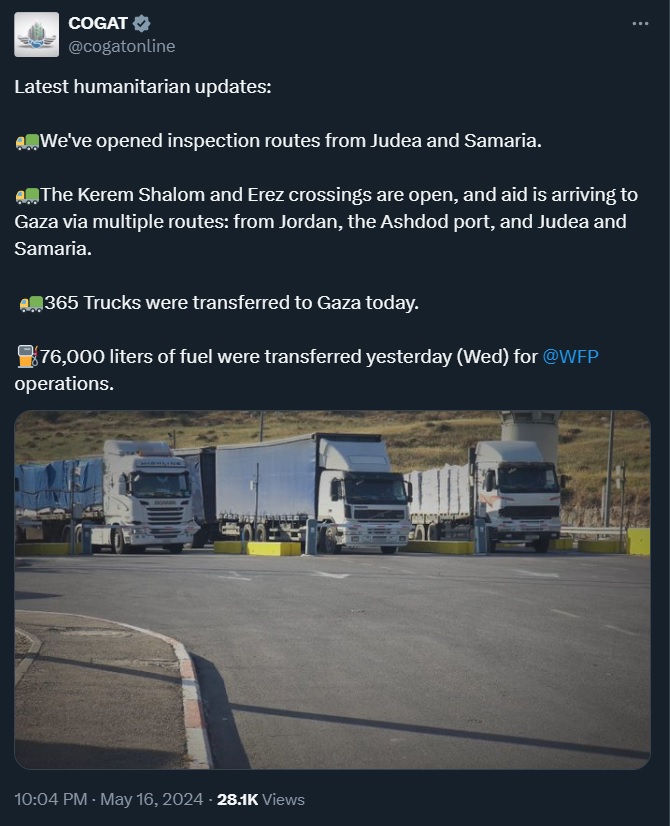
The day after that, the number of trucks entering the Gaza Strip was 342, with additional air drops also taking place.
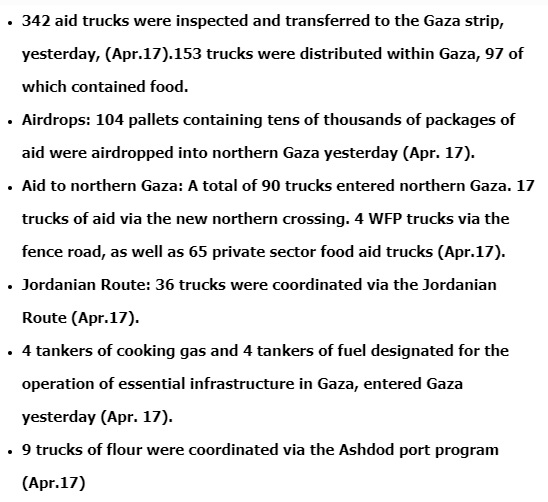
Clearly the portrayal presented by Paul Adams does not accurately and adequately inform BBC audiences of the situation regarding the entry of humanitarian aid to the Gaza Strip, including on the topic of Egypt’s refusal to divert aid via the Kerem Shalom crossing.
“A senior Biden administration official briefing reporters offers very rare criticism of Egypt over what they said was Cairo’s withholding of UN humanitarian assistance from Gaza.
What should be going into Kerem Shalom is the UN assistance, which is now in Egypt. Egypt is holding that back until the Rafah crossing situation settles out,” the senior administration official says.
“We do not believe that aid should be held back for any reason whatsoever. Kerem Shalom is open. The Israelis have it open. And that aid should be going through Kerem Shalom,” the official adds.”
On May 17th, the BBC News website published a report by Vicky Wong headlined “US confirms first aid trucks arrive via Gaza pier” in which readers are told that: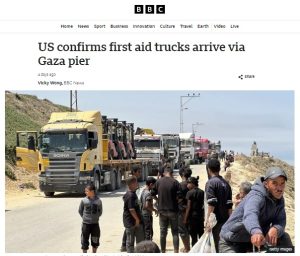
“The first shipment of humanitarian aid has arrived in Gaza via a temporary floating pier, the US military has confirmed. […]
Prime Minister Rishi Sunak said 8,400 plastic shelters had been delivered. About 500 tonnes of British aid including tents, hygiene kits and forklift trucks is expected to reach Gaza via the pier, built by US armed forces, in the coming weeks.”
Linking to Adams’ second report, the article also states:
“Hundreds of tonnes of aid arrived in Cyprus on Wednesday where it was screened before being loaded on to ships for delivery to the pier.
Smaller US military vessels – capable of carrying between five and 15 lorries of aid – then transported it to the floating pier, which is several hundred metres long and fixed to the beach in Gaza.
The lorries travelled along the pier before dropping off the aid at a marshalling yard on the beach.
Authorities said that the UN, primarily the World Food Programme, would be responsible for the onward distribution of aid.”
Five days after the appearance of Wong’s report, the US military reported that over 569 tonnes of aid had already entered the Gaza Strip via the new maritime route. However on the same day, Reuters and other media outlets reported that:
“The U.N. said that 10 truckloads of food aid – transported from the pier site by U.N. contractors – were received on Friday at a World Food Programme warehouse in Deir El Balah in Gaza.
But on Saturday, only five truckloads made it to the warehouse after 11 others were cleaned out by Palestinians during the journey through an area that a U.N. official said has been hard to access with humanitarian aid.
“They’ve not seen trucks for a while,” a U.N. official, speaking on condition of anonymity, told Reuters. “They just basically mounted on the trucks and helped themselves to some of the food parcels.””
BBC audiences have yet to see any reporting on that story. Both Adams and Wong devoted just one sentence in their reports to the issue of the theft of humanitarian aid, notably without any mention of Hamas:
Adams (report 2): “But given the threats faced by aid convoys, which have been looted by gangs, mobbed by desperate civilians, and shot at by the Israeli military, how safe will this operation be?”
Wong: “Deliveries to Gaza have considerably slowed down. Sending aid by land can be dangerous, with convoys at times looted by gangs and mobbed by desperate civilians.”
If the BBC really does intend to provide its audiences with accurate and impartial information on the topic of humanitarian aid to the Gaza Strip – a topic which has become all the more relevant in recent days given the ICC’s accusation of ‘starvation’ – it should not only focus on the amount of aid entering via crossings and other routes but also start reporting more thoroughly on what happens to that aid once it enters the territory and the actions of some Palestinians which prevent that aid from reaching civilians.
Related Articles:
BBC NEWS IGNORES US STATEMENT ON HAMAS SEIZURE OF AID
BBC NEWS SIDELINES HAMAS ATTACKS ON HUMANITARIAN AID CROSSING

